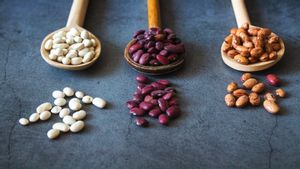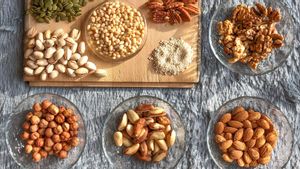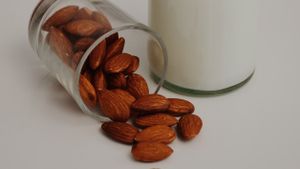YOGYAKARTA – Milk is good for children because it is rich in calcium. Calcium supports the growth of young bones. However, for children aged before 1 year, experts or pediatricians recommend exclusive breastfeeding. Other alternatives need to be considered considering the allergies that the child has. Is it okay to give non-diary milk to children older than 1 year?
"Milk can be a healthy option for those who want to give it to their children, but children over the age of 1 can become very healthy simply by drinking water, or drinking alternative milk," explains pediatrician Joel Gator, MD., reported by Verywell Family, Tuesday, August 9.
Dr. Gator adds, plant-based milk is a fantastic alternative. Vegetable milk or non-diary milk, is more tolerated by children than cow's milk.
Based on the recommendations of the American Academy of Pediatrics (AAP), cow's milk or soy milk for children. The reason is because both types of milk are rich in amino acids and fat content. Alex Caspero, MA., RD., recommends non-dairy milk that is rich in calcium and vitamin D.
"Most non-diary milk is rich in calcium and vitamin D, even more than cow's milk," said Caspero. He also noted that some milk contains DHA, B12, vitamin A, and other nutrients that are essential for a child's growth.

Meanwhile, in addition to calcium obtained from milk, either dairy or non-dairy, it can also be obtained from daily food. Such as kale, broccoli, sunflower seeds, and tahini. When giving non-diary milk, Gator provides suggestions and recommendations.
First, look for alternative milk that is free from preservatives. In addition, choose a low sugar content.
In addition, when looking for alternative milk, choose the best. At least it has nutritional value comparable to cow's milk in terms of protein and calcium content. For reference, 8 ounces of cow's milk contains 8 grams of protein, 300 mg of calcium, and 3 mcg of vitamin D. So what non-diary milk is recommended for children after 1 year? Here's the list.
Soy milk
Soy milk is often recommended for children with allergies to cow's milk which contains lactose. It's also a good option for parents looking for a dairy alternative for other reasons. Caspero explains, if your child needs more calories and protein, soy milk is the best choice. Typically, an 8-ounce serving of soy milk contains 8 grams of protein, 450 mg of calcium, and 3 mcg of vitamin D.
Oat milk
Oat milk or oat milk is great because it has a higher carbohydrate content. Oat milk is also high in calcium and vitamin D. For preschoolers, you can look for wheat milk which is high in fat and low in sugar. This non-diary milk, may contain less protein. But it is higher in calcium content.
SEE ALSO:
Peanut milk
If your child is not allergic to nuts, nut milk includes almond milk to cashew milk, hazelnut milk, and others, can drink this milk alternative. But because the calories in almond milk are lower, it is not recommended for toddlers and preschoolers who need more calories. However, a mix of cashews and almonds can contain 10 grams of protein, 450 mg of calcium, and 15 mcg of vitamin D.
That's the recommendation of non-diary alternative milk. It is important to note, the transition from breast milk and/or formula milk occurs around the age of 1 year. The AAP recommends that children 12-24 months of age drink whole milk to get the extra fat they need in their diet to promote proper brain development. The transition to non-diary milk can be done gradually, for example by mixing some alternative milk with breast milk or formula.
The English, Chinese, Japanese, Arabic, and French versions are automatically generated by the AI. So there may still be inaccuracies in translating, please always see Indonesian as our main language. (system supported by DigitalSiber.id)


















